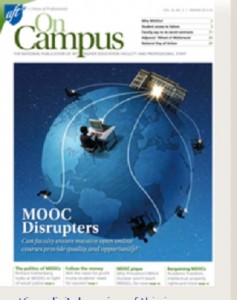Dear Commons Community,
On Campus, the American Federation of Teachers (AFT) periodical on higher education, is devoting the current edition to “MOOC Disrupters”. The articles examine the major issues (scale, social stratification, affordability, venture capital) from the AFT’s point of view. Below is the Editor’s Note on this edition.
Tony
======================================
MOOC Disrupters
On Campus
Winter 2013-14
Editor’s Note
MOOCs for the masses? Not so fast
Since massive open online courses burst on the scene two years ago, MOOCs have been heralded as a disruptive force for innovation in higher education that will magically solve the large policy challenges we face as a nation: How do we get more Americans to attend college and complete their studies? And how do we bring down the costs?
In California, where the two leading MOOC-based startups, Udacity and Coursera, were launched in 2012, a powerful Democrat in the state Legislature jumped onto the bandwagon earlier this year, introducing SB 520. This was a bill that would have forced the state’s 145 public colleges and universities to accept lower-division course credits from low-cost online college alternatives. It passed in the state Senate, but was put on hold when an experiment at San Jose State University, where Udacity was hired to provide remedial math courses, revealed how poorly served at-risk students are by massive online learning. Udacity founder Sebastian Thrun now says he sees that his courses can be “a lousy product.”
Florida is the only state whose romance with MOOCs has produced legislation. Earlier this year, the Legislature passed HB 7029, a bill allowing corporations and vendors to design, teach and grade courses that public institutions can accept credit for. As United Faculty of Florida President Tom Auxter has observed, “When commercial vendors replace online courses faculty now teach with courses designed by the venders, they stand to make windfall profits at the expense of student learning.” That won’t happen in this incarnation of the law, as UFF and faculty bodies managed to block some of the worst elements in the final version of HB 7029. They are fighting to protect the integrity of public higher education offerings.
Right now, no one is making money on MOOCs, but some see them as a gold mine. As Susan Meisenhelder shows in “Follow the Money” on page 7, venture capitalists are sinking millions into new startups. Even Moody’s Investor Service is bullish on MOOCs—both as a business and an asset that will boost the PR profile of elite nonprofit universities.
The articles in this issue capture the reservations faculty and educational staff have over massive, one-size-fits-all education. On the one hand, teachers are open to new tools that expand teaching and learning options in the classroom. Michael Feldstein describes how adaptive learning technologies, for example, hold great possibilities for tailored learning (see page 17). On the other hand, faculty and staff are wary of silver bullets imposed by outsiders with vested interests that have little to do with what works best for students and their teachers. MOOCs open the door to even greater exploitation of a contingent academic workforce and a reduction of the faculty role in governance, their academic freedom and intellectual property rights, and their control over the curriculum and their jobs.
Hanging over all this is the concern that MOOCs, with their as-yet unproven utility for the majority of students our members serve, could actually stratify our students and society in ways antithetical to the promise of education in a democracy, argues Richard Kahlenberg in “The Politics of Online Learning” on page 4. AFT members are working for just the opposite—to reclaim the promise of affordable, high-quality education in the United States that provides equal opportunity for all.
—Barbara McKenna


